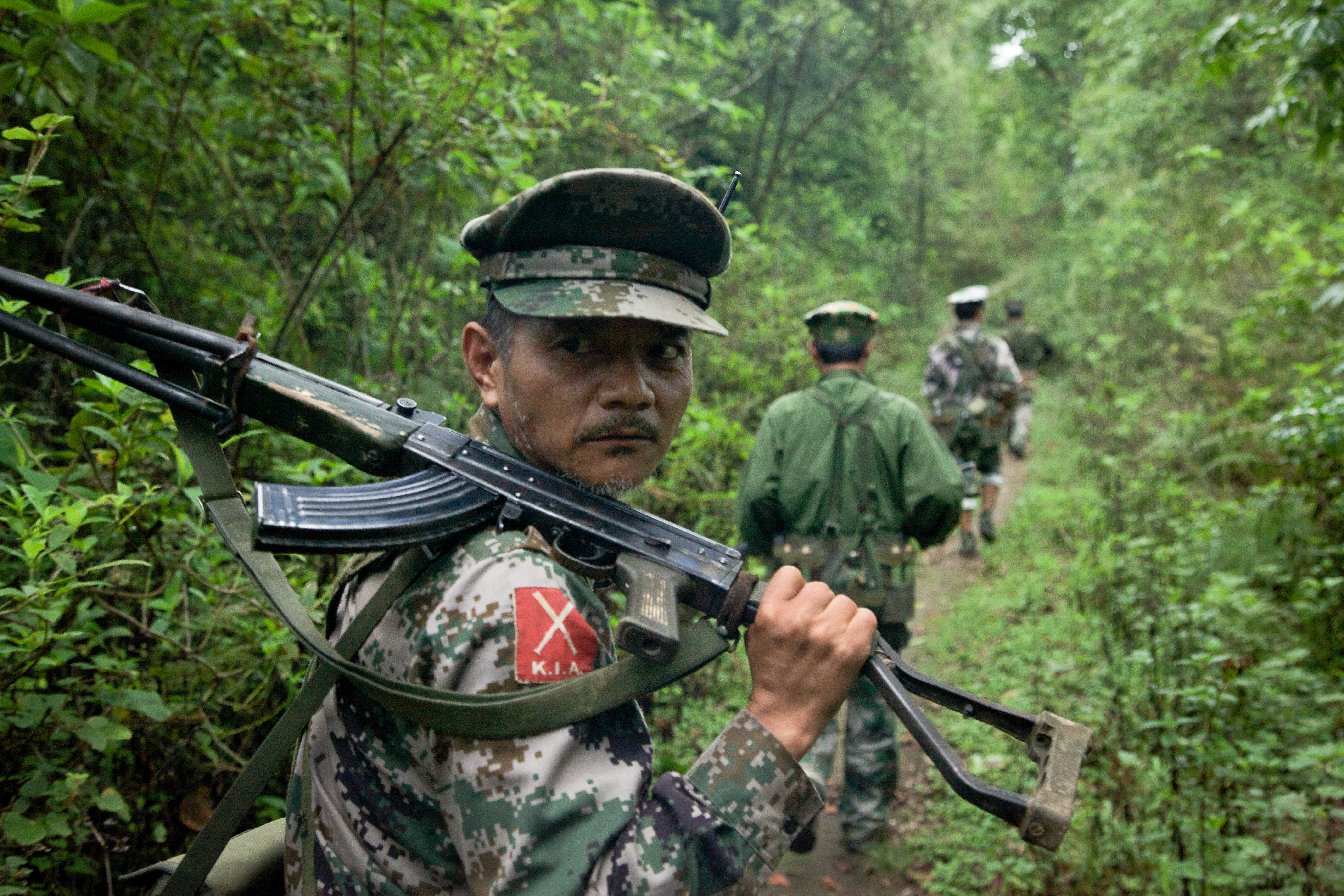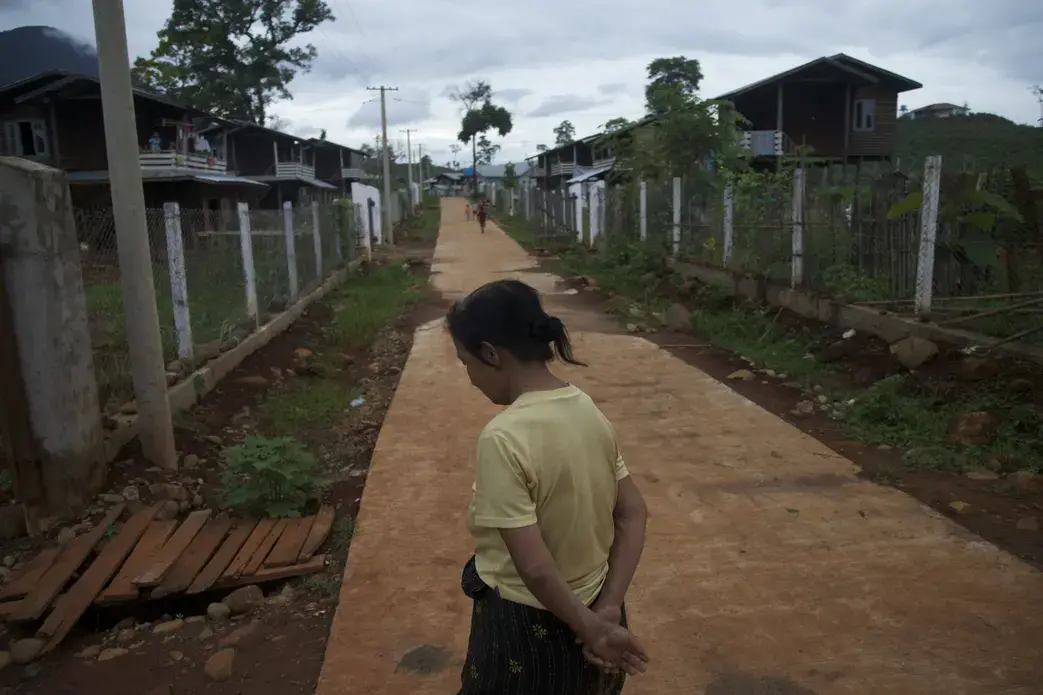In Tang Hpre, Burma, Father Thomas Gum Rai Aung points to a spot in the emerald hills that flank his village to show how high the floodwaters will rise if a dam project nearby is completed. "Everything we've built here will be gone in an instant," he said, with a sweep of his arm.
For now, the project is on hold. But Rai Aung has already lost his flock.
Two years ago, authorities in Burma, also known as Myanmar, began forcibly relocating thousands of ethnic Kachin to clear the way for the hydroelectric dam. The Chinese-financed initiative was approved on the grounds that electricity and the revenue it generates would improve livelihoods in an isolated region with poor infrastructure and few economic prospects.
Construction was halted last year after a public backlash over the dam's social and environmental impact. But activists worry that Chinese leverage with state officials will succeed in restarting the project, threatening a fragile ecosystem and nascent chances for a peace settlement with ethnic rebels who say the dam violates native rights on territory that historically belonged to them.
The Myitsone dam, a joint venture with the state-owned China Power Investment Corp., is the first and largest of seven planned along the Irrawaddy River, Burma's most vital waterway. Slated for completion in 2019, the dam would send 90 percent of the electricity generated from northern Kachin state across the border to China's southwestern Yunnan province in exchange for $17 billion over 50 years.
Burma's state-run media initially reported that more than 2,100 people from five villages would be moved to "model villages" and given new houses equipped with running water and electricity. On a Web site launched as part of a public relations campaign, the Chinese company says it has invested $25 million in the resettlement while "fully respecting the desires of the project-affected people."
Critics dispute those claims. In an August letter to the government, Nobel Peace Prize laureate Aung San Suu Kyi said 12,000 ethnic Kachin from more than 60 villages had been severed from their homes and traditional way of life. She warned that the Myitsone project poses serious environmental risks, made worse by nearby fault lines that "raise the specter of horrendous devastation" in the event of an earthquake.
A Bleak Outlook
President Thein Sein's decision to suspend the project was seen as a blow to China, the former military regime's main patron, and a sign that democracy might finally be taking hold in a land where opposition groups have had little room to breathe, let alone effect change.
Analysts speculated that it might also be another indication that Burma is tilting from China's orbit toward the West. In the months since, fast-track political and economic policy changes have warmed Burma's relations with the United States and the European Union.
In Kachin state, however, Burmese generals have ignored the president's calls to end hostilities, which have intensified since the army attacked territory controlled by the rebel Kachin Independence Army near contested dam sites on the Taping River. According to a March report by Human Rights Watch, both sides acknowledge that the fighting is partly about such projects.
The fighting has displaced an estimated 75,000 civilians, and there are reports of grave human rights abuses. Most of the refugees live in ramshackle camps along the Chinese border in rebel-controlled territory. As many as 10,000 have fled to China, and the rest are in camps around the riverside capital of Kachin state, Myitkyina, which is about 25 miles south of the Myitsone project.
Historically a hub for border trade with China, Myitkyina, a city of about 150,000 people, has not experienced the economic growth seen in many of Burma's lowland cities. Infrastructure is shoddy, and the people endure rolling blackouts and perennially high unemployment. Local religious leaders say the bleak social and economic climate has led to a sharp rise in drug abuse and depression among Kachin youths.
"Conditions today are hopeless" for the Kachin, said one shopkeeper, 28, who spoke on the condition of anonymity because he feared trouble with state authorities. He earned an engineering degree two years ago, he said, but has found no work in his field.
"Our people have so many grievances against the Burmese," he said.
'I am a farmer without land'
Less than an hour's drive north, scores of Kachin evicted by the Myitsone project live in a sprawling Chinese-sponsored resettlement camp ringed by fences. Row upon row of wood and tin-roofed homes are interspersed with community buildings, including a meditation center, a health clinic and a new high school. But residents say they lack what is needed most: freedom of movement.
"We are stuck here with nothing to do. I am a farmer without land," said Mung Doi, 35, who sneaked back to his village despite being forbidden to do so, only to return to camp when Burmese troops and guerrillas exchanged fire in the area.
Farther along the road to Myitsone, Kachin villages lie derelict, with scattered trash and broken fences suggesting a hasty departure. Between the empty clusters of homes, gold mining operations have turned former rice paddies into heaps of upturned earth; once-dense teak forests in the surrounding hills have been reduced to stumps.
Religious leaders say that after residents were forced out, a host of private mining and timber companies connected to powerful northern military commanders moved in.
Rapid deforestation, unregulated mining and erosion have taken a heavy toll on the Irrawaddy ecosystem, according to Burmese activists and environmental watchdogs. They fear that if the dam project moves forward, its impact will extend far beyond the project site, to communities downstream that rely on the river flow and adequate nutrients to sustain the rice production on which the country depends.
The Chinese, meanwhile, are lobbying hard to resume construction, and there's a gathering sense among Kachin residents that they will ultimately get their way.
Rai Aung, the parish priest, is convinced that it's just a matter of time. In his view, the war with the Kachin rebels has delayed construction, but he doubts that the president has enough political clout to thwart the interests of generals who still call the shots in the backcountry.
"I'm waiting for the water to come," he said. "Then I will leave for good."









